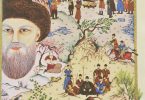On the one side, while a Grand empire was stepping down from the stage of history, on the other side, the same empire was defending its land.
Thousands of our sons had passed away and the struggle to live and gain independence in Gallipoli went down into the books of history of the western countries as ´Gallipoli´ and a great defence of a country.
The Çanakkale Martyrs´ Memorial alone is proof of this glorious struggle and is considered the sound of the lands and wail of history. With the price paid here, the lands became our motherland and the struggle of the Turkish soldiers not only made history of the Turks but also of the world.
The Gallipoli Victory, apart from revealing the true power of the nation and its spiritual strength, also proved to the whole world just what it is capable of doing in order to protect its independence, honour and motherland.
As part of the 100th Anniversary of the Gallipoli Victory, we have interviewed Ekrem Saltık, who has undertaken many works on this topic.
In short, Could you evaluate the importance of the Gallipoli War from the perspective of the Ottoman State and its spiritual status in its collective memory?
The Gallipoli War, which took place 100 years ago and prolonged the span of the World War I, was the biggest global clash of world history, resulting in great losses of all those who were involved in the war, and in a sense, buried with it a whole generation together with an unknown future carrying an ancient tradition. The Allied Forces, which consisted of almost half a million soldiers had left their homelands and arrived at the shores of Çanakkale after a long sea voyage, only to lose hundreds and thousands of its soldiers and return back to where they came from. The Ottoman army, which had resisted the Allied Forces like an unexpected hurricane of the seas, had blocked the Gallipoli Strait with their flesh and bones and had lost more than 250 thousand lives. The majority of those Ottoman soldiers who lost their lives at the Gallipoli Fronts were young students or intellectuals. The sunset taking place every day throughout the Gallipoli War was in fact extinguishing the final sparkles of an ancient fire, in which a generation that preferred spirituality to materialism, was fighting for its existence, while still standing tall.
And what would have happened if they were able to pass through Çanakkale?
If they were able to pass through Çanakkale, which was just one of the war fronts during World War I, then surely a state which went beyond the limits of time and space and a whole civilisation together with its ideologies would have been buried eternally in history. Çanakkale would have definitely been a place where an era would have come to a close. If Çanakkale was passable, then İstanbul, the capital of the Ottoman State which was conquered by Mehmet the Second, and that had become a victim to many sieges in its past, would have also been conquered. If Çanakkale was passable, then the British State, which had orchestrated World War I and Tsarist Russia would have never come to an end and nor would we have been able to establish the Republic of Turkey, which was reborn from the ashes of an ancient empire despite having to pay for it with the cost of all of the Ottoman soldier´s lives.
The Gallipoli War is given great importance in Australia just like it is in our own country. How was it that the Anzacs, among them the Australians, had gotten involved in the Gallipoli War?
In order to understand why the Anzacs came to Gallipoli and became involved in a war which would be written down in history, we ought to go back in time even before World War I; back to the final years of when Queen Victoria (1851–1914) ruled the Great British Empire for almost sixty four years. When one looks into how volunteers from the towns of Australia and New Zealand, called ¨the Anzacs¨, could have volunteered for a war thousands of kilometres away from their homes, and in consideration of the great number of loss they would give, it seems like a tragic ‘eclipse of reason’. However, if we are to undertake a historical analysis, we need to think of the Anzacs gathered from Australia and New Zealand together with the process taking place under the era of Queen Victoria. The era of Queen Victoria was one in which the ‘civilisation’ policies were being implemented with great determination. At the same time, it was a period when Australia, New Zealand, South Africa and Canada were given the ‘dominion’ status. These states, which received the dominion status, were still dependent on Great Britain although they seemed to be independent in their foreign policy matters. Based on this, during the month of August of 1914, Britain which had declared war on Germany, had also notified its dominions about this declaration of war and the involvement of Australia and New Zealand in this war managed to turn the conflict into a world war.
Australia which was actually quite distant from all of the military strife of the world prior to World War I, did not have any form of armed force or army. Public order was provided by the local security forces at the continent and it could have only been foreseeable to send ‘voluntary’ men to a possible war in Europe. As well as there being groups against the war, there were also some who supported it. Articles were being published in the newspapers speaking of the unconditional need of Australia having to support Britain. The politicians and government officers were speaking of a Japanese and German threat in the Pacific, and defending the idea of standing besides Britain ‘the Motherland’, until ‘the last soldier and last shilling’. While the external political forces were in play, those groups against the war were resisting against all the activities of the government that was trying to increase the number of the voluntary soldiers. The socialists, who were pressuring the unions in various cities of the continent, were undertaking a serious resistance against Australia getting involved in a war in Europe. In accordance to the laws of Australia, there was no obligation to join war while the Colony Law gave Australia and New Zealand the right of being neutral. However, in a telegraph sent from Britain in 1914, there was a request of information regarding the military assistance and support that Australia was to provide.
Was the only reason of including Australia and New Zealand in this war due to the request of Britain?
Putting aside the request of Britain, the most important reason as to why Australia and New Zealand became involved in World War I was the threat of Germany they would face if Britain was to lose. World War I, which was necessary to take part in for the purposes of ensuring the political and military security of their countries, was a great chance in order to eliminate the German threat in the South Pacific as well as halting the swift rising of Japan in the Pacific. World War I was to be the first military operation of Australia and New Zealand, which had attained their dominion status from Britain in the year of 1907. Based on this, it was not long until the Australian forces were given under the British orders and furthermore, it was acknowledged that an army of 20 thousand soldiers would be dispensed in accordance with the strategic plans of Great Britain. At the same time, the Australian Government guaranteed to provide its armed forces. Despite all of the announcements calling upon the soldiers throughout the country, the government could not attain the desired number of soldiers by the end of 1914 due to the resistance of the socialist unions. The reason there were many Maori and Ranatongan locals amongst the Anzacs fighting the Turks at the Gallipoli Front in February 1915, was because of the fact that the Australian Government was not able to convince its own population to join the war. In order to ensure support of the Australian public for the war, fear had to be spread about the enemy forces already invading the continent. In my opinion, this attack of Broken Hill was the first ‘September 11 conspiracy theory’ of the 20th century. Many propoganda awakening the hatred of the Turks had to be undertaken.
Can you talk a bit about the Broken Hill attack, which you have expressed to be ‘the first September 11 conspiracy theory of the 20th century?’
The incident of Broken Hill took place in a small mining town in the South of Australia. By propogating about the Ottoman State, thus the Turks, being barbarians who invaded the land during the time of World War I, this theory was orchestrated in order to ensure that the Australians would enter the war and thus, can be considered the ‘September 11’ of Australia. The attack had taken place at this location on the first day of 1915, when the public still refused to join World War I. According to witness statements about an attack on a picnic train carrying civilians, there supposedly were Turkish flags hanging on an icecream van and there were also people wearing Ottoman military uniform. After opening fire on the train, two of the attackers had also been in a cross fire with the police, wounding an elderly witness, and both of the attackers had supposedly died – one during the attack, and the other at the hospital. This event was on the headlines the next morning with ‘The Attack of the Turks’ emphasis, and many articles followed throughout January in regards to how revenge ought to be taken from the ‘barbaric’ Turks who dared to kill innocent Australian civilians. The attack that took place in Broken Hill had caused the first sparkles of hatred towards the Ottoman state by the Australian public who were initially distant to World War I and thus, was effective in the Anzacs coming to Gallipoli to fight. We can understand this through the diaries of the Anzacs, who all defined the Turks as being ‘barbaric’.
What can you say about the importance of the Gallipoli War from the perspective of the Anzacs and the perceptions of the Australians who perceived the Turks to be “barbaric”?
Surely, it is not possible to attain conclusions as to the general perception of the Gallipoli War for the Anzacs, and particularly for the Australians. However, we could make some evaluations with certain clues that we could find. Firstly, we are well aware that the Australians fought in many countries for Great Britain, as well as being mercenaries. However, we are also aware of their confessions of how they perceived the Gallipoli War as a national struggle. The Australians, who believed that the loss they experienced in Gallipoli led them to develop the notion of being a nation, and had also affected and still affects their outlook of the Turks. They believe that the loss at Gallipoli against the Turks was a crucial turning point in their own history. The fact that they declared the 25th April – the day they had landed at Ariburnu, and have ever since called it the Anzac Shore – a national holiday, is the reflection of this belief. The Australians, who visit Gallipoli during the Gallipoli War anniversary every year, return back to their homes by taking sand from the beaches of the shores, and keep or give away these sands, which they see as holy, special gifts.
Before coming to Gallipoli, the Anzacs had written in their diaries about how Turks were barbaric. However, after getting to know the Turks during the Gallipoli War, they also confessed in those very same diaries that they were not barbaric, and quite the contrary, hospitable, heroic and good-intentioned people.
The Australian soldiers, who had the chance of getting to know the Turks during the war, had returned back to their homes and narrated to those around them their observations. After a while, it came to be known that the Broken Hill attack was actually not undertaken by the Turks but by Afghani camel riders and thus the perception of the ‘Barbaric Turk’ had withered since the beginning of the 1920s. If the negative perception of the Australians had towards the Turks were all because of the Broken Hill attack, then the perception of ‘the heroic Turks’ were due to the very fact of the attitude of the Ottoman soldiers towards the enemy soldiers at the Gallipoli war. The merciful behaviour of the Turkish soldier who had ran to the middle of the war zone under heavy fire, to save a wounded Anzac, and carrying him on his back and saving him from death, has been narrated and will continue to be narrated just like the incident of Broken Hill.









Leave a Comment